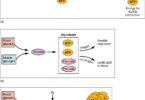Once the bundle of joy finally arrives, new parents’ lives can be filled with unparalleled bliss and joy. But it can also bring up feelings of uneasiness and even profound sadness. Postpartum depression affects many new parents and is a very difficult experience to address. This article will explore the myths and facts of postpartum depression and provide advice on how to cope and ask for help.
1. What is Postpartum Depression?
Postpartum depression, commonly referred to as PPD, is one of the most common illnesses experienced by new mothers, affecting anywhere from 13–20% of new mothers. It is a serious type of depression that can be very strongly debilitating.
Symptoms: PPD can cause a range of symptoms, including: a feeling of intense sadness, persistent crying, general irritability, difficulty sleeping, changes in appetite, lack of energy, difficulty concentrating, and, in some cases, thoughts of self-harm and suicidal ideation.
Causes: There are many possible contributing factors to PPD, including social isolation, a history of depression (including during the pregnancy), difficulty breastfeeding, stress, fatigue, and a lack of supportive relationships.
Treatments:
- Psychotherapy: Psychotherapy is often used to treat PPD. This involves discussing your experiences and feelings with a mental health professional to better understand the depression, problem solve, and develop healthy coping mechanisms.
- Medication: Antidepressants are commonly prescribed for postpartum depression. Your doctor will help you choose the right medication for your individual condition.
- Support groups: Support groups provide a place to discuss your feelings with other mothers who are going through similar experiences.
- Relaxation techniques: Relaxation techniques, such as deep breathing and mindfulness, can help ease stress and reduce symptoms of postpartum depression.
It is important to remember that although postpartum depression can be a very challenging experience to go through, it is possible to recover with the right help. If you are struggling with postpartum depression, do not hesitate to reach out to a mental health professional for help.
2. Challenges of Postpartum Depression
Having a baby can be one of the most overwhelming experiences a person goes through. Along with the new joy and responsibility of being a parent, postpartum depression can lurk, ready to challenge your newfound happiness. Without proper care and awareness, postpartum depression can deepen, wreaking havoc on all aspects of life. It is time to face this challenge head-on and discover how to manage the struggle.
Signs and Symptoms of PPD
- Intense fatigue
- Excessive worry or guilt
- Lack of interest in things you used to enjoy
- Irrational thoughts of self-doubt or inadequacy
- Isolation or withdrawal from friends and family
- Difficulty concentrating
- Irritability
- Sleep disturbances
- Lack of appetite
It is important to be aware of these signs so that you can recognize them in yourself or in someone close to you. If you or someone else notices any of these signs, seeking help early is encouraged. That way, postpartum depression can be managed before it spirals out of control.
Triggers of PPD
Postpartum depression can be triggered by a range of things. These may include physical exhaustion, emotional stress, hormonal changes, and the transition to parenthood. New moms may also struggle with the lack of personal time, the lack of support, or financial strain. All of these can aid in the development of a depressive state.
Managing PPD
Though PPD can be a difficult struggle, there are things you can do to help manage it. It is important to remember that the condition is treatable and that you do not need to face it alone. There are a variety of treatments, including medication, psychotherapy, or even herbal remedies. It is vital to get plenty of rest and to set aside time for yourself. Social connection and support is also critical; talk to friends and family who can provide understanding and care. Doing activities that provide joy or relaxation, such as reading, listening to music, or taking walks can also be helpful. Lastly, seeking help from professional resources such as a therapist or doctor can aid in recovery.
Postpartum depression is a challenge; however, awareness, understanding, and treatments can help manage the struggle. It is important to remain vigilant and recognize the signs and symptoms in oneself and in others. Knowing what to look out for and managing PPD in the early stages is key to avoid more issues, so don’t be afraid to seek help when necessary.
3. Impact on Mental and Physical Health
Postpartum depression can have a significant impact on a mother’s physical and mental health. Studies have found correlation between postpartum depression and difficulty with breastfeeding, low emotional responsiveness, and instability of self-confidence and behaviors in the mother. There can also be a direct correlation between the depression and a lack of interest in the baby, less expressed warmth, lack of proper nutrition, and general reckless behavior.
Chronic Stress: Mothers with depression are prone to chronic stress due to the overwhelming feelings of fatigue and helplessness. This can lead to a greater risk of depression related illnesses such as heart disease, stroke, and diabetes. The decrease in mood during the postpartum period can often make it difficult for mothers to take the proper time for self-care such as sleep and exercise.
Social Isolation: Postpartum depression can make it difficult for new mothers to interact with others. Isolation can increase feelings of loneliness and further feelings of depression. This can also lead to greater risks of difficulties with making connections within the community or with friends and family.
Nervous System Effects: The dramatic changes in hormones, as well as the feelings of intense anxiety, can institute physiological changes within the body that can lead to longer-term effects upon the nervous system. Since the brain is home to the regulation of hormones, it can be difficult to counter the impulses that it sends to the body and mind.
It is important for mothers to identify the signs and symptoms of postpartum depression early in the process. This can go a long way to mitigating the long-term effects of depression on mental and physical health. Some helpful ways to reduce the risk of postpartum depression include:
- Talking to a healthcare provider or mental health specialist about the depression.
- Developing a plan for postpartum self-care, such as time for rest, relaxation, and exercise.
- Joining a support group to talk to other mothers about postpartum depression.
- Making time for activities that provide pleasure and encourage bonding with the baby.
- Incorporating mindfulness and meditation into daily routines.
4. Breaking Through the Taboo
Eliminating Negative Notions
From the very start, postpartum depression is shrouded in a cloak of shame and stigma. Having a baby is a joyous moment, and the mother’s insecurities or sadness tend to play out within a subversive context. To combat this, emphasizing the range of emotions someone can experience following childbirth is paramount. Acknowledge this fact, remind those affected that they are not alone, and allow families and friends to provide the necessary support.
Building Self-Esteem
Having a new baby is an extraordinary challenge and one that evokes a multitude of emotions. But when these emotions become overwhelming and begin to consume normal activities, it’s time to make a shift in thinking. Appreciate yourself and recognize the strength and courage it takes to face this struggle. Take small steps to build positivity in your life and move in the direction of healing.
Navigating the Medical System
When in the throes of depression, it’s hard to make decisions about medical care. Traditional methods focus heavily upon natural remedies, but if anxiety persists and interferes with daily functioning and relationships, additional clinical intervention may be necessary. Research and explore health care plans, providers and care teams to make sure the right resources are in place.
Organizing a Support Network
Having a support system is integral when dealing with postpartum depression. Whether in the form of therapists, peers, or family, feeling connected to those who are walking alongside is invaluable. Connect with those who have been through similar journeys and keep an open dialogue. Their insights can be a great source for comfort and inspiration.
5. Identifying Symptoms in Yourself or a Loved One
Diagnosing Postpartum Depression:
Postpartum depression is not always easy to recognize. The symptoms can be subtle and may not always present themselves in the same way for each person. It is important to pay attention to the signs and symptoms, whether figured out in yourself or someone close to you.
Reaching Out For Help:
A first important step when it comes to identifying postpartum depression is to reach out for help. Educate yourself as much as possible about the condition and keep an open dialogue with loved ones about any changes you’re noticing in yourself or them. Postpartum depression occurs in both mental and physical aspects, so it is important to keep track of any changes.
Signs To Look Out For:
- A racing heart rate or panic attacks
- Mood swings or irritability
- Extended periods of feeling overwhelmed and helpless
- Shifts in eating habits
- Sleep disturbances
- Thoughts of guilt or worthlessness
- Difficulty bonding with baby
It is important that any changes significant enough to interrupt daily functioning be addressed as soon as possible in order to maintain emotional and physical wellbeing. If you feel like you are not able to control your emotions or you do not connect to your role as a parent, do not hesitate to ask for help. Postpartum depression can be treated with therapy, medications, or a combination of the two.
6. Practical Strategies for Coping
1. Maintaining A Positive Mindset
It is essential to ensure that the thoughts we keep in mind are positive ones. This may involve thinking more positively about oneself and engaging in activities that lift our spirits. It can be beneficial to write a “gratitude list” where we record five things we are thankful for each day. This practice can help to put our struggles into perspective. Additionally, the act of recognizing our blessings can encourage greater levels of happiness.
2. Cultivating Social Support
Having other individuals who we can rely on to provide emotional and social support is key when it comes to managing postpartum depression. These individuals can serve as a listening ear when we need to express our feelings or fears. Additionally, it is beneficial to have individuals we can lean on for practical tasks such as child care. This helps to reduce stress. Some useful sources of support include:
- Friends and family
- Support groups (online or in person)
- Therapists/counselors
- Clinicians
- Medical support providers
3. Mindful Time Management
When times are stressful, managing our resources (time, energy and money) can be key in building resilience. It’s important to take stock of the ways in which we are using our resources and finding ways to maximize them. Mindful scheduling can also be beneficial, involving breaking down a task into smaller chunks and then taking breaks in between them. This helps to create a sense of accomplishment, as well as preventing burnout.
4. Taking Care of Our Bodies
Taking care of ourselves physically has a strong connection to how we feel emotionally. Making sure to engage in moderate exercise, enough sleep and healthy food can help us to manage the physical fatigue that can be associated with postpartum depression. It is also important to pay attention to personal hygiene, as it can have a positive effect on our emotional states.
5. Exploring Creative Outlets
Incorporating creative activities into our lives can be beneficial. This can involve activities such as painting, drawing, photography, crafting or music. This can help us to express our feelings or thoughts in an imaginative way and can also be used as a distraction from negative emotions. Additionally, creative activities can help to improve our sense of well-being.
6. Setting Maintainable Goals
At times when we are feeling overwhelmed, it can be useful to break down our struggles into achievable goals. This helps to create a sense of control and can make our situation feel more manageable. It is important to remember that it is ok to start small and then gradually increase our goals as our mental health improves. Additionally, it is important to recognize our successes and reward ourselves when we achieve our goals.
7. Professional Treatments for Postpartum Depression
1. Counseling – One of the most common forms of treatment for postpartum depression is counseling, either one-on-one or in a group setting. Through counseling, affected individuals can learn about their emotional states and gain insight into the ways in which they can cope with their condition. Counseling can also provide a safe space to express emotions, thus helping to improve a person’s wellbeing and reducing isolation.
2. Medication – In certain cases, the physician may prescribe antidepressants to help manage the severity of the postpartum depression symptoms. Medications can help to treat the underlying causes of postpartum depression, such as a chemical imbalance in the brain. It should be noted, however, that it is always recommended to use the lowest possible dose of medication.
3. Life Changes – Making life changes can be beneficial when trying to manage postpartum depression. Some of the changes one could consider include:
- Implementing a self-care routine
- Managing stress levels better
- Joining a support group
- Introducing physical activities
4. Light Therapy – Light therapy has been found to be effective in treating postpartum depression. It involves exposure to bright artificial light in order to increase the amount of serotonin in the brain in a non-invasive and natural way. By Doing this, an individual improves their mood and energy levels.
5. Dietary Changes - Incorporating specific foods into your diet or avoiding certain ones can significantly reduce depression symptoms. Introducing foods that contain Omega-3 fatty acids, such as salmon, nuts, and flax seeds, can help to improve the mood. Eliminating caffeine and other stimulants like energy drinks can also help to reduce anxiety and feelings of restlessness.
6. Aromatherapy – Aromatherapy has been found to be effective in treating postpartum depression. Essential oils, such as lavender, orange, and chamomile, can help to relax the body and mind. Inhaling them or rubbing them onto the skin can have a calming and calming effect.
7. Exercise – Exercise has many therapeutic benefits, and it is a great way to help manage postpartum depression. Engaging in physical activity can help to improve overall mood by releasing endorphins, which can reduce stress, anxiety, and depression. It is important to find activities that you enjoy and that you can do on a regular basis.
8. Crafting a Support Network
Many of us think of postpartum depression as a burden to bear. But the truth is, it doesn’t have to be like that. for yourself can be a powerful tool in addressing the struggle with postpartum depression.
Start with your support system: Your support system can include anything from a close group of friends and family to a health care provider. Make sure you are reaching out to people who are willing to listen and provide constructive feedback. It’s important to keep in mind that you are the one in charge of your healing process and it’s your job to choose who is a part of that process.
Consider informational resources: There are many resources available online and in print about postpartum depression. Read books, articles, and blogs to better understand the struggle and learn healthy ways to cope. Several organizations, such as Postpartum Support International, offer helpful information and education about postpartum depression.
Explore therapy options: Talk therapy is an excellent way to acquire personal insight, practice self-care, and find support. You can speak with a therapist who is familiar with postpartum depression to help you find the proper coping skills. There are also specialized therapies, such as cognitive-behavioral therapy (CBT), that are designed specifically for postpartum depression and can provide you with coping tools that you can use to address daily struggles.
Seek out activities that soothe and support: It may feel like you don’t have the energy to do anything but it’s important to take small steps in finding activities that make you feel good. Go for a walk in the park, start a new hobby, join a support group, or just take a few moments for self-care each day. Doing something just for you can help lift your spirits and make you stronger.
Be mindful of nutrition: Proper nutrition is key when it comes to living with postpartum depression. Eating a variety of healthy foods, like vegetables, whole grains, and lean proteins can help to balance out your moods. Eating regularly scheduled meals and snacks can also help make sure your body has the fuel it needs to get through the day.
Crafting a strong support network can be a powerful tool in addressing postpartum depression. Reach out to the people who care about you, explore the resources available to you, invest in therapy, and take the time to do things that make you feel good. This will help strengthen your coping skills and give you the support you need during this difficult time.
9. Conclusion
Postpartum depression is a very serious issue, one that needs to be addressed with proper treatment and care. It is important that new mothers understand how to recognize the symptoms of postpartum depression in order to seek help early on.
As mentioned earlier, postpartum depression can manifest in different ways depending on the individual. Some common signs and symptoms include feelings of sadness or emptiness, sleep problems, a lack of bonding with the baby, feelings of guilt and inadequacy, and loss of interest in activities and hobbies. These are just a few examples, and it’s important for new mothers to be aware of how they’re feeling and to reach out for help if they need it.
It is also important for mothers to recognize that postpartum depression is common and that seeking help is nothing to be ashamed of. There are many resources available to help new mothers, including support from family and friends, counseling, lifestyle changes, and even some medications in extreme cases.
- Reach Out For Help – Make sure to speak to trusted family and friends about how you are feeling. Talking to someone can help to relieve the burden of postpartum depression.
- Practice Self-Care – Make sure to take time for yourself and focus on yourself. Self-care can help combat postpartum depression.
- Seek Professional Help - If things don’t improve with the help of family and friends, consider seeking professional help. There are many therapies and treatments available to help new mothers.
There is no one-size-fits-all approach to treating postpartum depression, as every individual’s experience is unique. It is important to seek help from professionals to find the best approach for the mother’s individual circumstances. Postpartum depression is a serious condition, but one that can be managed with the right help and support. Postpartum depression may seem like an insurmountable struggle to those who experience it, but the good news is that it can be managed and treated. With the right amount of support and understanding, mothers affected by postpartum depression can and will find a place of strength and courage in the face of hardship. Remember, you are brave and strong.








